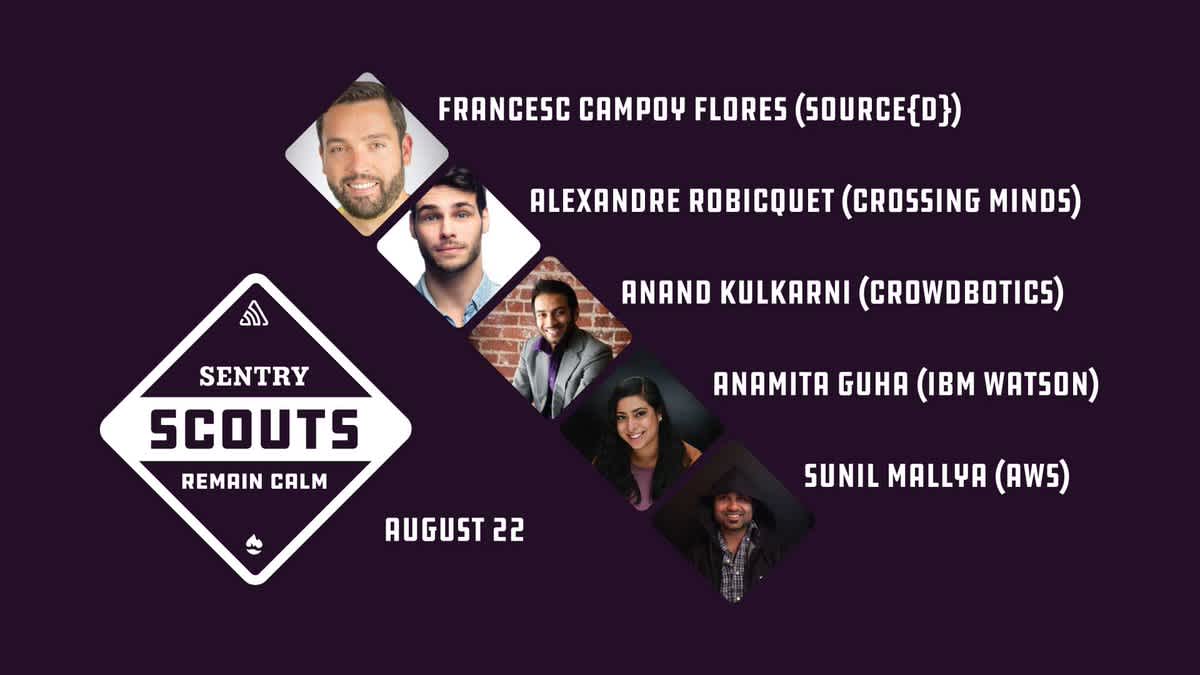Sentry Scouts: Machine Learning — A Recap
Sentry Scouts: Machine Learning — A RecapSentry Scouts Meetups are organized by software developers for software developers, about the future of building and using software. Sign up for the next Sentry Scouts Meetup or enjoy a video of a past Meetup.
Or do both. Or do neither. Or simply become paralyzed by choice and take a nap.
Our data is being collected all the time, from our search histories to our spending habits. Creepiness aside, there’s actually a science behind this data collection and the learnings it uncovers. That science is the topic of our August edition of Sentry Scouts — machine learning (ML).
In case you haven’t heard, Sentry Scouts are an opportunity for like-minded friends and professionals to swap stories around a faux campfire (a fauxre, if you will). Don’t worry — we also provide plenty of camp-related non-pizza snacks and drinks to go around. We gathered a group of learned (heh) experts:
Our panelists traveled various paths to ML, but the common marker was a curiosity for how humans make decisions. At some point along the way, our panelists discovered that, as Anamita Guha explains, ML helps “decipher what humans are doing before they even know.”
In that case, ML would probably be able to predict that you are about to read (and enjoy) the following takeaways from Sentry Scouts: Machine Learning.
AI is what you say when you’re trying to get money from people. ML is what they say when they’re trying to hire you.
Machine learning vs. artificial intelligence
ML might be a popular buzzword, but the exact definition isn’t always clear, especially when compared to artificial intelligence (AI). Panelist Anand Kulkarni summed it up by saying “AI is where we can be 20 years from now. ML is what we can do today.” He also added, “AI is what you say when you’re trying to get money from people. ML is what they say when they’re trying to hire you.”
Any way you look at it, ML and AI are intimately entwined. Guha imagines a nested relationship, with AI encompassing ML, which in turn surrounds deep learning. “AI is the desire for computers to [have intelligence].” ML is how we go about giving computers that intelligence.
Measuring success
While ML is a science, it’s not quite an exact science (yet). Sunil Mallya implores anyone working with ML to “look at [ML] like any problem, and define your objective.” He also warns against having unreal expectations. People often expect ML tests to be perfect every time, but that’s simply not the case. Instead, use a standard baseline for measurement. Or, as Alexandre Robiquet advocates, “focus on minimizing the error.”
Mallya also explains that ML is always improving — or learning if you will. As the machine itself learns, the baseline should evolve. Always ask for feedback and use it to make improvements to the tests.
Code and algorithms are only as good as the people building them.
Let’s avoid Skynet
Until very recently, companies did not actually want to use ML. They often didn’t trust the process or believe that the ML tools could deliver as promised. Now that the technology is more widely adopted, Francesc Campoy Flores asks “how do we avoid creating Skynet?”
We start by not being afraid of evolving technology. Guha reminds us that “relationships with tech are personal. Everyone grew up with and interacts with tech differently." We should recognize that different places in the world have varying degrees of comfort with ML. By respecting that and by meeting people where they are, engineers can work together to continue developing and understanding the impact of ML. After all, “code and algorithms are only as good as the people building them.”
Thank you to everyone who joined us for Sentry Scouts: Security. We hope to see you [next time] (https://www.meetup.com/Sentry/). In the meantime, you’ll want to check out our fantastic blog, educational (yet fun) tutorials, and other helpful resources.
See you there! Or here, on the internet!




